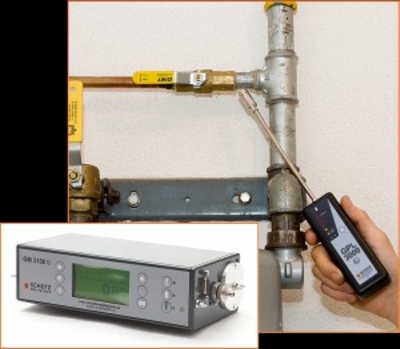Control of gas installations and gas systems in the house
 The G465-1 set of rules (inspection of gas pipe networks and gas systems) drawn up by the DVGW requires regular checks as part of preventive maintenance. This set of rules applies up to the so-called main shut-off device (HAE / gas tap). After the main shut-off device, the requirements of TRGI G600 apply.
The G465-1 set of rules (inspection of gas pipe networks and gas systems) drawn up by the DVGW requires regular checks as part of preventive maintenance. This set of rules applies up to the so-called main shut-off device (HAE / gas tap). After the main shut-off device, the requirements of TRGI G600 apply.
If a leak rate of less than 1 l / h occurs in an internal gas installation, the installation is considered usable. If the leak rate is higher, measures must be taken to eliminate this leak. If you measure on exposed pipelines, you must take the type of measuring device into account when evaluating the measurement result.
Only if there is a homogeneous gas distribution in the room, both measuring device systems show the same measured value.
1. Aspirating process
These measuring devices suck in the gas concentration in the room. You do not have to stand or measure in the immediate vicinity of the leak to obtain a reading, although a small one. By the constant intake of room air, you will quickly receive a measured value.
Important: These measuring devices suck in more than 1 l / min and dilute the gas concentration flowing out of the leak.
Example: You have a leak of 1 l / h = 0.016 l / min. If you suck in the entire amount of gas, 0.984 l / min natural gas-free ambient air is added. Theoretically, you get a measured value of a maximum of 1.6% by volume. As a rule you will get a much lower reading.
The following gas detection devices and gas measuring devices from Schütz Messtechnik can be used for this purpose.
2. Diffusion measurement method
The escaping gas concentration slowly diffuses into the measuring chamber. They measure a higher concentration than with a suction measuring device. Pay attention to the distribution of the gas. Regardless of the location of the leak, the gas (natural gas) always flows upwards.
The following gas detection devices and gas measuring devices from Schütz Messtechnik can be used for this purpose.




